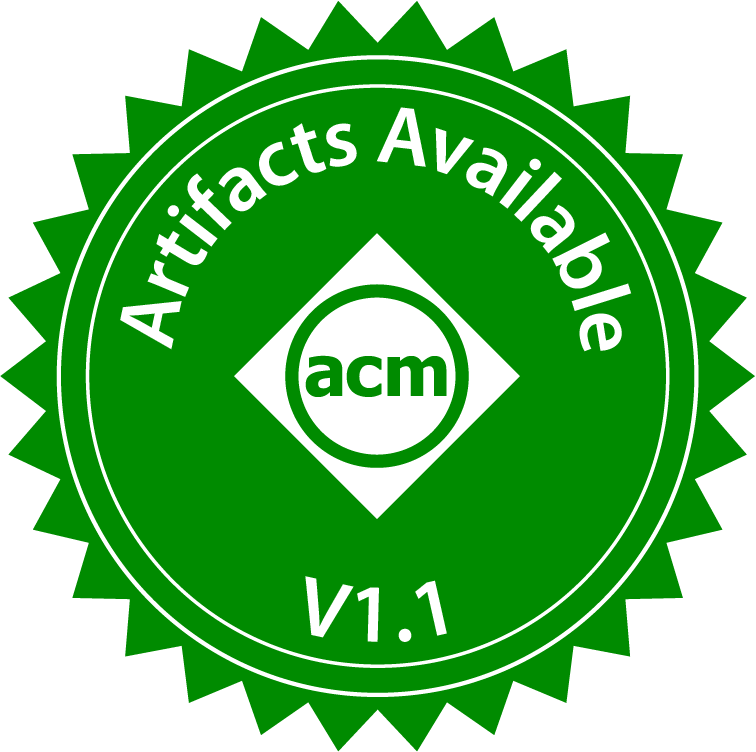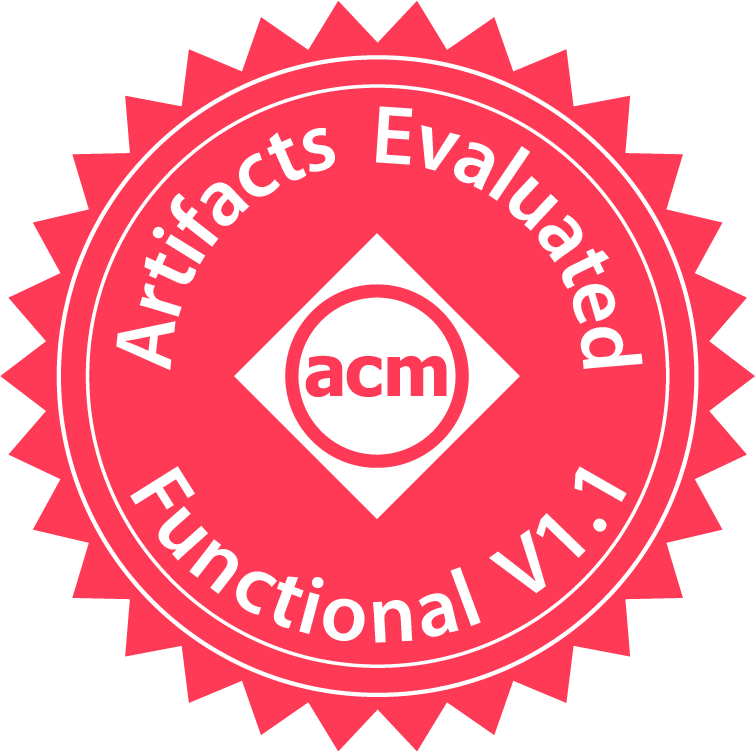Artifact Review Summary: dSpace: Composable Abstractions for Smart Spaces
Artifact Details
Badges Awarded
| Artifact Available | Artifact Functional |

|

|
Description of the Artifact
Artifact location: https://github.com/digi-project/sosp21-artifact
Artifact README: https://github.com/digi-project/sosp21-artifact
The authors provided a GitHub repo with the source code and example scenarios for testing dSpace. Specifically, the artifact consists of different examples to simulate various scenarios described in the paper. The artifact also includes Mock devices/scenarios so that evaluators can test the framework without physical IoT devices. In addition, the artifact also has a benchmarks section to reproduce results of a few charts presented in the paper.
The instructions are relatively clear to follow. The system can be easily deployed with minikube.
Environment(s) Used for Testing
The environment used for evaluation by evaluators.
- Evaluator-1: Physical machine, Ubuntu 18.04.5 LTS, minikube v1.23.0, python 3.8.0
- Evaluator-2: CloudLab profile provided by the AEC chair which pre-installs Kubernetes (v2.16) on the top of CloudLab’s standard Ubuntu 18.04 image. Python 3.7 and 3.8 are both used, but most of the tests were conducted on 3.7.
- Evaluator-3: CloudLab with k8s profile for evaluation, which include three nodes.
- OS env: Ubuntu 18.04.1 LTS (kernel: 4.15.0-147-generic).
- Python: Python 3.7.12
- Gcc: gcc (Ubuntu 7.5.0-3ubuntu1~18.04) 7.5.0
- golang: go version go1.17 linux/amd64
- Evaluator-4: K8s single node configuration provided by CloudLab, Ubuntu 18.04, Python3.7, and minikube1.13
- Evaluator-5: Local desktop machine
- OS: Ubuntu 20.04 LTS
- Python: 3.8.10
- minikube: v1.23.1
- kubectl: v1.22
Step-By-Step Instructions to Excercise the Artifact
Although evaluators faced problems regarding setting up environment—e.g., version of python and other dependent libraries, configuration (.yaml files), and docker images—most of the issues have been addressed by the authors during the artifact evaluation process. Thus, most people would be able to simply follow the the author’s instructions to test dSpace.
Special notes to excercise the artifact:
- In the QuickStart part,
pip install -e. should be in runtime/driver, instead of runtime/driver/digi/ - Python version should be
>= 3.7. - You may need
sudo apt-get install python3.7-devif you miss some python headers - Use
make gen KIND=tvinstead ofmake gen KIND=TVin QuickStart. It seems that the script is case-sensitive. - It’s strongly suggested to use local repo, or manually copy your docker images into minikube.
- To run benchmarks, do not forget modify the
REPOinbenchmarks/digis/Makefile(if you use your own docker repo) - In mocks/lamp/deploy/cr.yaml, the value for brightness should be map like
intent: 0.8, and the value for power should beintent: "off" - Use old version of kopf, i.e.,
pip install kopf==0.28.3 - In benchmarks/digis/measure/deploy/cr.yaml, should use “name: {{ .Values.name }}” instead of name: “\{\{ .Values.name \}\}”
How The Artifact Supports The Paper
The artifact supports the claims (functionalities) made in this paper. The framework is programmable and working for several scenarios.
Specifically, the following is the claims listed in the paper and how the AE supports them.
Performance Claims
The performance results are presented in Figure-7, which give the FPT, BPT, and DT costs for three scenarios, i.e., Lamp, Room-Lamp, and Scene-Room.
A significant result is that the costs of dSpace (FPT+BPT) are much less than device costs.
The AE provides lamp and room-lamp benchmark cases (based on emulated dev).
The results are shown in below (Note: the results are produced by the environment of Evaluator-3).
lamp
lamp-test
python lamp.py
warmed up
{'backward_leaf': 1631604503.1615288,
'forward_leaf': 1631604502.9493866,
'start': 1631604502.9408576}
{'bpt': 0.004289388656616211,
'dt': 0.2121422290802002,
'fpt': 0.008528947830200195,
'ttf': 0.2249605655670166}
room_lamp
lamp-test
python room_lamp.py
warmed up
{'backward_leaf': 1631605331.3310592,
'forward_leaf': 1631605331.1202724,
'start': 1631605331.0724647}
{'bpt': 0.008245706558227539,
'dt': 0.2107868194580078,
'fpt': 0.04780769348144531,
'ttf': 0.26684021949768066}
In Lamp, the (BPT+FPT)/DT=6%, and in ROOM_LAMP, the value is 26%. The results are basically match 20% and 45% in the paper as the emulated env may lead to less propagation time.
Programmability Claims
A significant new contribution of dspace is to ease the programming efforts for smart-home applications. The AE well supports this.
Specifically, it provide cases:
- Build and run a single digi app (i.e., the TV demo) which allow users to edit the intent, e.g., power
- Compose two digis: a lamp digi is shown to be mounted to a room digi, and I can use kubectl to editi room’s brightness
- Policy: the AE also gives example with yield policy, which is a case for scenario-10 in the paper (delegation of control)
As a result, evaluators agree the AE for availability and functionality badeges.
Additional Notes and Resources
The evaluators presented the following suggestions that can improve the artifcat.
- It should provide an example about dynamically mounting a device to different parent devices.
-
It should provide more diverse example scenarios. In addition, it would be awesome if users can connect dSpace to IoT device simulators, so that they demonstrate their deployment scenario in a more intuitive way.
- Prepare a list of supported real devices and give demo for those devices.